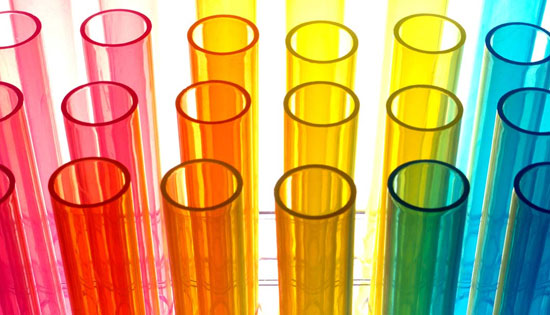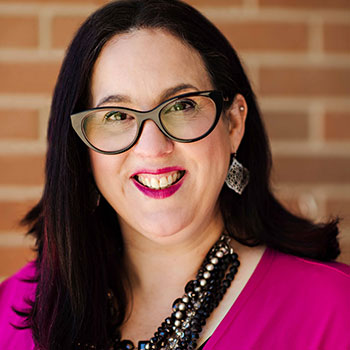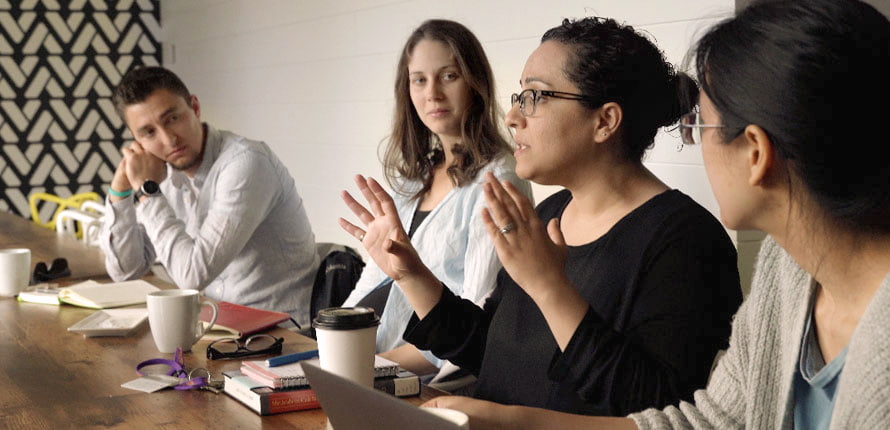Search for academic programs, residence, tours and events and more.
Our Master of Science (MSc) program in Chemistry covers the traditional and modern disciplines of chemistry and biochemistry. The research conducted by our expert faculty is interdisciplinary in nature, and enriched by close collaboration between research groups within and outside the department.
Our strength is in our relatively small and well-integrated department, which provides you with a strong education in modern aspects of chemistry and biochemistry, as well as experience in cutting-edge research combined with close mentoring from faculty members.

Faculty with a diverse range of interests.
Program provides transferable and practical skills for life after graduation.
Eligible full-time students may receive funding.
Our MSc in Chemistry is a 24-month (six consecutive terms), full-time program.
Students must defend a thesis based on original research. They are also required to complete two or three half-credit courses, one of which can be from another graduate program at Laurier, and four half-credit research seminar courses. In the seminar course, students must present at least one seminar based on their thesis research. Other seminars are presented by faculty and invited speakers.
The research in our faculty spans a wide range of interests, from biophysics of biomolecular interactions to environmental chemistry to organic and inorganic synthesis, and from structural analysis and chemistry of molecules in living cells to preparation of nanocomposite materials for applications such as sensors or catalysts.
The MSc in Chemistry program is aimed at providing students with transferable practical skills, as well as a comprehensive background in a variety of close-knit chemical disciplines. Graduates will be prepared to use their acquired knowledge and experimental skills in organic, inorganic, biological, physical and analytical chemistry to solve multifaceted theoretical and experimental problems.
Half-credit courses vary by year but may include:

"Immerse yourself in all Laurier has to offer while completing your graduate education. Enjoy the journey – remember to have fun too!"
Paula C. Fletcher, associate dean, Faculty of Graduate and Postdoctoral Studies
Take the first step in your graduate education and apply to one of our graduate programs. Follow our three-step admission process — we’ll walk you through how to apply and prepare for your first day as a graduate student.
After you have submitted your OUAC application, paid the non-refundable application fee, and Laurier has received your application, you'll receive an email from gradadmissions@wlu.ca advising you to upload the additional required documentation to Laurier’s Online Registration and Information System (LORIS).
Please note, the application process and the uploading of supplemental documentation, which includes references, typically takes two weeks. To avoid disappointment, please apply early.
An application for admission to our MSc program in Chemistry must include:
Visit our Graduate Admissions Toolkit for more information about applying.
Proficiency in written and spoken English is essential to graduate studies at Laurier. Applicants whose language of instruction during their previous postsecondary education was not in English must submit evidence of proficiency in English. If applicable, results from accepted testing services must be uploaded to LORIS.
Questions? Contact chemgrad@wlu.ca.
Regardless of the type of graduate degree program you intend to pursue, financial planning is important. At Laurier, we want to provide you with as much information as possible about a variety of scholarship and funding opportunities and equip you with the skills to manage your finances effectively in the years to come.

When you graduate from our program, you’ll be an independent scientist ready to meet the challenges of our contemporary global society. You can also continue your studies towards a professional degree, or a PhD degree at Laurier or another postsecondary institution.
A sample of the many diverse career opportunities in the field of chemistry:
ASPIRE is Laurier's professional skills development training program for graduate students. The program helps you craft an individualized, extracurricular learning plan tailored to your professional journey and entry to the workplace.
Learn about the interests and ongoing research of our faculty members. If their research interests you, email the professor directly to set up a meeting. Include information about yourself, your skills, your experience, and why you’re interested in their research.
Dean, Faculty of Science
Professor
Louise Dawe
Associate Professor
Lillian DeBruin
Associate Professor
Graduate Coordinator
Dmitri Goussev
Professor
Geoff Horsman
Associate Professor
Vladimir Kitaev
Professor
Stephen MacNeil
Associate Professor
Kenneth Maly
Associate Professor
Chair, Department of Chemistry and Biochemistry
Scott Smith
Professor
Michael Suits
Associate Professor
Dirk Wallschläger
Professor
Think this is the perfect program to continue your education?